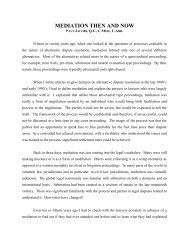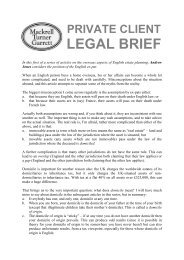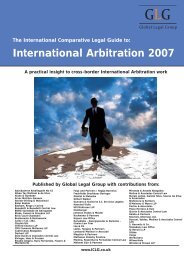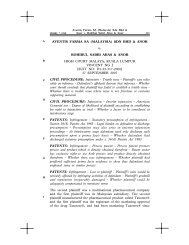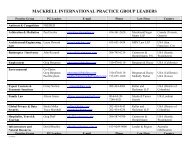izconsult law LLCVietnamVietnamTuan Nguyen, Phong Le, Hanh Bich, Huyen Nguyen, Hai Ha and Thuy Huynhbizconsult law LLC1 Types of transactionHow may businesses combine?The most common forms of business combinations in Vietnam areacquisitions, joint ventures, mergers and consolidations.Generally, an acquisition includes share deals and asset deals.In terms of legal definitions, ‘acquisition’ does not have one commonlegal definition. It is defined across various laws of Vietnam,as follows:• the Law on Investment provides for a partial share transfer orsubscription as one form of direct investment. It is distinctivefrom an ‘acquisition’, which is a complete share transfer;• according to the Law on Competition, the acquisition of anenterprise means the purchase by one enterprise of all or part ofthe assets of another enterprise sufficient to control or govern allbusiness lines or one business line of the acquired enterprise; and• acquisition of a credit institution is, however, differently regulated,being the purchase of all of the assets, rights and obligationsof the target credit institution. After the acquisition, thetarget becomes a subordinate entity of the acquiring entity.An asset transfer, as opposite to a share transfer in the M&A context,is nevertheless not regulated. Asset transfers, including businesstransfers, are usually structured as share transfers whereby the targetbusiness is intentionally separated and transferred to a specialpurposevehicle, the shares of which would then be acquired by theinvestor. An asset transfer could also be straightforward between theseller and the buyer, which includes one or numerous sale and purchasetransactions. An asset transfer is also mentioned in the Law onInvestment through the term ‘project transfer’. The project transfermay be followed by the liquidation of the transferring entity.A merger means a situation where one or more companies ofthe same type (merging companies) may be merged into anothercompany (merged company) by way of transfer of all lawful assets,rights, obligations and interests to the merged company and, at thesame time, termination of the existence of the merging companies.Consolidation means a situation where two or more companiesof the same type (consolidating companies) may be consolidated witheach other to form a new company (consolidated company) by wayof transferring all lawful assets, rights, obligations and interests tothe consolidated company and, at the same time, terminating theexistence of the consolidating companies.2 Statutes and regulationsWhat are the main laws and regulations governing businesscombinations?The Law on Enterprises and the Law on Investment are the two mainlaws generally governing business combinations and applicable to allcompanies incorporated in Vietnam. Specific regulations addressingprivate equity transactions are Decree No. 102/2010/ND-CP, DecreeNo. 01/2010/ND-CP, Decision No. 88/2009/QD-TTg and CircularNo. 131/2010/TT-BTC. If the acquisition involves shares of a publiccompany, the Law on Securities, Decision 55/2009/QD-TTg, DecisionNo. 121/2008/QD-BTC and related rules and regulations willapply. Cross-border transactions will be subject to the Law on ForeignInvestment, the Ordinance on Foreign Exchange and the WTOCommitments. Where an M&A transaction triggers a competitionconcern, the Law on Competition must be observed.3 Governing lawWhat law typically governs the transaction agreements?Generally, the law of the jurisdiction in which the target company isestablished or where the assets for sale are located is selected as thegoverning law of the agreements. The specific law will vary dependingon the particulars of the transaction. The choice of foreign lawrather than Vietnamese law is accepted to the extent that it is notcontrary to the basic principles of Vietnamese law.4 Filings and feesWhich government or stock exchange filings are necessary inconnection with a business combination? Are there stamp taxes orother government fees in connection with completing a businesscombination?M&A transactions involving companies that are active in certainindustries such as banking and finance, aviation or insurance mayrequire approval of their industry regulator. When state-owned assetsor equity are involved, the approval of the relevant state bodies isrequired. In addition, the transaction may have to be conductedthrough a competitive method such as tender or bidding if it involves30 per cent state capital.For acquisitions of public companies, the Law on Securitiesrequires an acquirer who wishes to acquire from 25 per cent of theshares of the target company to file a tender offer application withthe State Securities Commission (SSC). The application comprisesthe registration application, the shareholders’ or board’s resolutionsof the purchaser regarding the tender offer and the shareholders’resolutions of the target in the event it redeems its shares to reduceits charter capital (if any). Upon completion of the tender, the offerormust report to SSC about the tender results within 10 days.In certain circumstances, a business combination involving aVietnamese company may be subject to the reporting requirementsof the Vietnam Competition Authority (VCA). Under the Law onCompetition, if the parties to a business combination have a combinedmarket share of between 30 per cent and 50 per cent of therelevant market they must notify VCA 30 days before the proposedcombination. The proposed combination can only be carried outafter written confirmation has been received from VCA that the combinationis not prohibited. The combination shall be prohibited if thecombined market share is above 50 per cent in the relevant market.www.gettingthedealthrough.com 411
Vietnambizconsult law LLCThere are two exemptions to this rule, such as where one or moreof the parties participating in the economic concentration is or areat risk of being dissolved or of becoming bankrupt; or where theconcentration has the effect of extension of export or contribution tosocio-economic development or to technical and technological progress.These exemptions, however, are not automatically granted.The relevant parties must file to VCA to request for exemption foreconomic concentration.In the case of a merger or consolidation, the investor must complywith the procedures under the Law on Enterprises regarding theliquidation of a company and the formation of a new company. Suchevents must be registered with the business registration authority andthe relevant authorities.If the acquisition results in a shareholder owning more than 5 percent of a public company, then information about such shareholdershall be reported to SSC, the stock exchange where the shares arelisted within seven days as well as being reported to the businessregistration authority.A business combination may require a change to be made to theinvestment certificate or business registration certificate of the targetcompany, or both. A fee of between US$2 and US$10 may be paidto register such change. In addition, the transaction will be subject tovarious Vietnamese taxes depending on the structure of the transactionas further specified in question 18.5 Information to be disclosedWhat information needs to be made public in a businesscombination? Does this depend on what type of structure is used?The information that needs to be made public in a business combinationwill depend on the type of structure used. As mentionedabove, the offeror must file a registration application with the SSCthat contains various information such as the name, address andhistorical business performance of the offeror and its market sharein the relevant business; the name and address of the target; the relationshipbetween the offeror and the target; the current shareholdingsof the offeror in the target; the number of shares to be acquired; theintention of the acquirer post-acquisition with respect to the target’soperation and employees; the sources of capital to fund the acquisition,etc. Upon receiving the approval of the SSC, the offeror mustmake public disclosure of the offer in three consecutive issues of anelectronic newspaper or printed newspaper.Public companies must report a change of 5 per cent or more inthe shareholding of any shareholder holding at least 5 per cent of theshares to the SSC and make a public announcement. Information tobe disclosed includes:• name, address and business lines of corporate shareholders;• full name, age, nationality, place of residence and occupation ofindividual shareholders; and• the number and percentage of shares owned by such shareholders.When there is a merger or consolidation of companies, the companiesmust notify their creditors of the merger or consolidation within15 days from of the merger or consolidation resolution.Furthermore, if the merger or consolidation triggers competitionconcerns then the companies must notify the Vietnam CompetitionAuthority or the Competition Council thereof. Information to bedisclosed includes financial statements of the past two years; a reporton the market share in the relevant market of the parties in the pasttwo years, list of subsidiaries, list of goods and services supplied, etc.6 Disclosure of substantial shareholdingsWhat are the disclosure requirements for owners of largeshareholdings in a company? Are the requirements affected if thecompany is a party to a business combination?A shareholder owning more than 5 per cent of a public companymust report to the SSC, the stock exchange where the shares are listedwithin seven days from the date of acquiring such large shareholdingsas well as being reported to the business registration authority. Wherethere is any material change with respect to the previously reportedinformation or a change in the shareholdings that exceeds 1 per centof the outstanding shares, such shareholder must also report to theSSC and the stock exchange where the shares are listed.7 Duties of directors and controlling shareholdersWhat duties do the directors or managers of a company owe tothe company’s shareholders, creditors and other stakeholders inconnection with a business combination? Do controlling shareholdershave similar duties?Besides the fiduciary duties that the directors and managers of acompany will assume under the Law on Enterprises, they have thefollowing duties.Directors, senior management and large shareholders withknowledge of information about a takeover situation shall not abusesuch information to trade shares for their personal benefit or supplysuch information, encourage or solicit others to trade shares beforethe official public disclosure of the tender offer. In addition, the boardof the target must notify the SSC and its shareholders of its opinionabout the offer to acquire.A business combination is a matter under the shareholders’authority, thus a business combination must be passed by theshareholders in a convened meeting. The chairman of the board isresponsible for convening such meeting pursuant to the proceduresstipulated by law in order to obtain the shareholders’ approval. Specifically,the chairman shall send notice of the meeting, the agendaand documents to the shareholders well in advance of the scheduledmeeting (at least seven working days).The law provides that the contract for a business combinationmust be sent to creditors within 15 days from its being approved. Itdoes not specify persons who are responsible for this but usually it isthe legal representative of the companies. Furthermore, the businesscombination shall be announced to the employees within the abovespecifiedtime limit.Directors and managers must also declare the details of companiesin which they own shares and companies in which their relatedparties own more than 35 per cent of the equity interest. A businesscombination involving either of these companies must be approvedby the shareholders or the board, as the case may be. A party whohas an interest in such transactions cannot vote.A director (general director) of a shareholding company will notbe allowed to concurrently hold the position of director or generaldirector of other companies.Generally the Law on Securities prohibits the following conduct:• directly or indirectly acting fraudulently or cheating, creatingfalse information or omitting essential information that causes aserious misunderstanding and adversely affects a public offering,listing and trading securities, conducting business and investingin securities, securities services and the securities market;• disclosing false information with the aim of persuading or provokingthe purchase and sale of securities, or disclosing incompleteor out-of-date information about events that have a majoreffect on the price of securities on the market;412 Getting the Deal Through – <strong>Mergers</strong> & <strong>Acquisitions</strong> 2013






